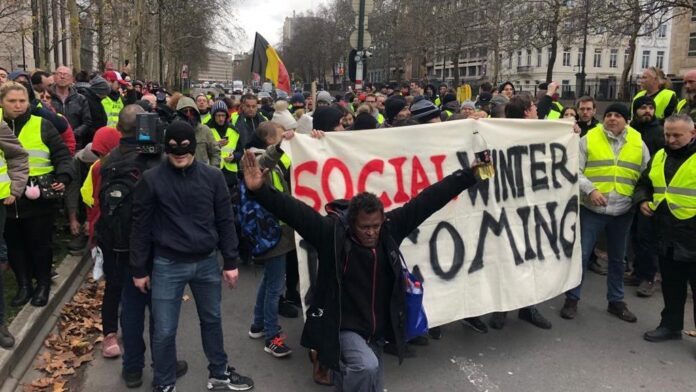More and more social layers are facing the perspective of poverty. In September STABEL announced the poverty thresholds for Belgium. According to the figures released, 25% of people in Brussels are found right on the poverty line. This figure is between 15.8 % and 18.8 % in Wallonia and right below 10 % in Flanders. These are the figures that STABEL released for 2021, calculated on the basis of income in 2020 (!).
Αn inaccurate picture
The above figures are not making us any wiser about the situation in Belgium today; on the contrary they are misleading.
Inflation in 2020 was at 0.74% and in 2021 2.44%. Today it is at 12% according to the Bureau fédéral du Plan data. Even taking into account these official figures, it is clear that poverty rates are much higher in 2022 than those published.
The real picture
Try as they might to embellish the situation of Belgian society, we are well aware of what our daily life looks like. Increasing prices make it difficult for people to buy the basic goods and our purchasing power is becoming weaker and weaker. The pressure on our families is too big and more people are slipping into a desperate reality every day.
The 2% increase given by the indexation lays far below our real needs and is being eroded by the price increases sweeping the market.
It is only right and fair that the indexation rates are equivalent to the inflation flow. That would only not mean increasing wages or allowances but most importantly maintaining them. The 2% increase only translates into a rapid reduction in our wages and further deterioration of our everyday lives.
Escalating strikes
Their economic model is considering absurd and impossible what seems to us only fair and reasonable. They only care about increasing the profits of big business and banks.
The only way to stop our impoverishment is to continue and escalate actions and strikes. French workers have achieved wage increases thanks to strike action. We need to follow their example and expand it. We also need to coordinate information flow and actions with workers from other European countries.
Our trade unions need to work out a strike escalation plan which should include:
- Continuing our struggle, with continuous strike action in the key sectors.
- Escalating strike action to stop our impoverishment.
- Involving in these strikes any other sectors of the economy, culminating in repeated general strikes.
- Organising a European action day to struggle for protecting our purchase power.
We need to use our first degree trade unions to push the leadership in this direction and have them prepare this action plan carefully, with info-sessions and leafleting at all working places.
We are fighting for :
- Real wage increases, equivalent to the inflation flow.
- Increases of the allowances for vulnerable groups, corresponding to the cost of living.
- Reform the 1996 law on the index: salaries must be readjusted according to the economic reality.
- Nationalisation of the energy sector, subjected to worker and social control.
- A cap on price increases for basic consumer goods.
- For unity among all Belgians, migrant workers and precarious people in Belgium and abroad.
Check us out at www.internationaliststandpoint.org/belgium
Contact us: internationalist.standpoint.be@gmail.com



